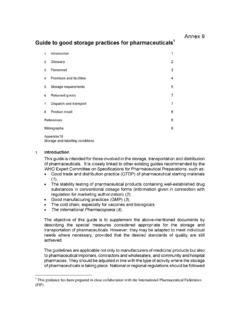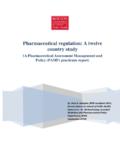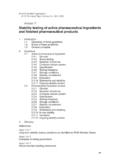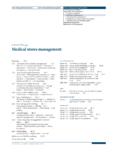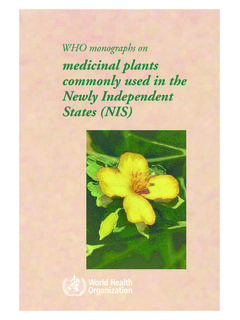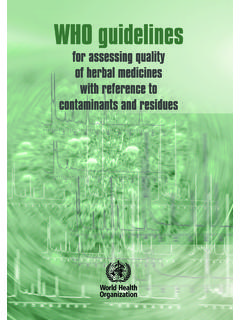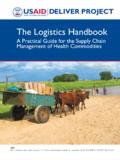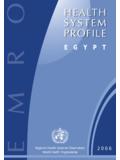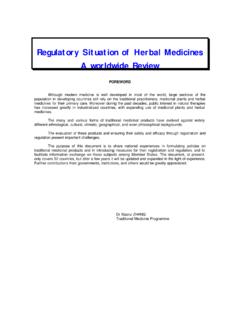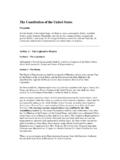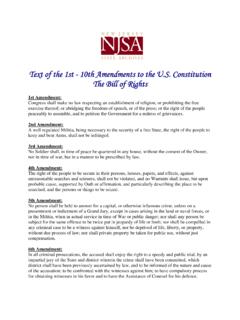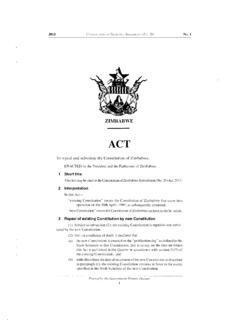Transcription of CONSTITUTION OF THE WORLD HEALTH ORGANIZATION1
1 CONSTITUTION OF WHO1 CONSTITUTION OF THE WORLD HEALTH ORGANIZATION1 THE STATES Parties to this CONSTITUTION declare, in conformity with theCharter of the United Nations, that the following principles are basic to thehappiness, harmonious relations and security of all peoples: HEALTH is a state of complete physical, mental and social well-being andnot merely the absence of disease or enjoyment of the highest attainable standard of HEALTH is one of thefundamental rights of every human being without distinction of race,religion, political belief.
2 Economic or social HEALTH of all peoples is fundamental to the attainment of peace andsecurity and is dependent upon the fullest co-operation of individualsand achievement of any State in the promotion and protection of healthis of value to development in different countries in the promotion of healthand control of disease, especially communicable disease, is a development of the child is of basic importance; the ability tolive harmoniously in a changing total environment is essential to extension to all peoples of the benefits of medical, psychologicaland related knowledge is essential to the fullest attainment of opinion and active co-operation on the part of the public are ofthe utmost importance in the improvement of the HEALTH of the have a responsibility for the HEALTH of their peoples whichcan be fulfilled only by the provision of adequate HEALTH and THESE PRINCIPLES.
3 And for the purpose of co-operationamong themselves and with others to promote and protect the HEALTH of allpeoples, the Contracting Parties agree to the present CONSTITUTION and1 The CONSTITUTION was adopted by the International HEALTH Conference held in New York from 19 Juneto 22 July 1946, signed on 22 July 1946 by the representatives of 61 States (Off. Rec. Wld Hlth Org., 2,100), and entered into force on 7 April 1948. Amendments adopted by the Twenty-sixth, Twenty-ninth,Thirty-ninth and Fifty-first WORLD HEALTH Assemblies (resolutions , , )
4 Came into force on 3 February 1977, 20 January 1984, 11 July 1994 and 15 September 2005respectively and are incorporated in the present 1 BASIC DOCUMENTS2hereby establish the WORLD HEALTH Organization as a specialized agencywithin the terms of Article 57 of the Charter of the United I OBJECTIVEA rticle 1 The objective of the WORLD HEALTH Organization (hereinafter called theOrganization) shall be the attainment by all peoples of the highest possiblelevel of II FUNCTIONSA rticle 2In order to achieve its objective, the functions of the Organization shallbe:(a) to act as the directing and co-ordinating authority on internationalhealth work;(b) to establish and maintain effective collaboration with the UnitedNations, specialized agencies, governmental HEALTH administrations,professional groups and such other organizations as may be deemedappropriate.
5 (c) to assist Governments, upon request, in strengthening HEALTH services;(d)to furnish appropriate technical assistance and, in emergencies, neces-sary aid upon the request or acceptance of Governments;(e) to provide or assist in providing, upon the request of the UnitedNations, HEALTH services and facilities to special groups, such as thepeoples of trust territories;(f) to establish and maintain such administrative and technical services asmay be required, including epidemiological and statistical services;(g) to stimulate and advance work to eradicate epidemic, endemic andother diseases;(h) to promote, in co-operation with other specialized agencies where nec-essary, the prevention of accidental injuries;(i) to promote, in co-operation with other specialized agencies where nec-essary, the improvement of nutrition, housing, sanitation, recreation,economic or working conditions and other aspects of environmentalhygiene.
6 (j) to promote co-operation among scientific and professional groupswhich contribute to the advancement of HEALTH ;(k) to propose conventions, agreements and regulations, and make recom-mendations with respect to international HEALTH matters and to performCONSTITUTION OF WHO3such duties as may be assigned thereby to the Organization and areconsistent with its objective;(l) to promote maternal and child HEALTH and welfare and to foster the abil-ity to live harmoniously in a changing total environment;(m)to foster activities in the field of mental HEALTH , especially those affect-ing the harmony of human relations;(n) to promote and conduct research in the field of HEALTH ;(o) to promote improved standards of teaching and training in the HEALTH ,medical and related professions.
7 (p) to study and report on, in co-operation with other specialized agencieswhere necessary, administrative and social techniques affecting publichealth and medical care from preventive and curative points of view,including hospital services and social security;(q) to provide information, counsel and assistance in the field of HEALTH ;(r) to assist in developing an informed public opinion among all peopleson matters of HEALTH ;(s) to establish and revise as necessary international nomenclatures of dis-eases, of causes of death and of public HEALTH practices;(t) to standardize diagnostic procedures as necessary;(u) to develop, establish and promote international standards with respectto food, biological, pharmaceutical and similar products.
8 (v) generally to take all necessary action to attain the objective of III MEMBERSHIP AND ASSOCIATE MEMBERSHIPA rticle 3 Membership in the Organization shall be open to all 4 Members of the United Nations may become Members of the Organiza-tion by signing or otherwise accepting this CONSTITUTION in accordance withthe provisions of Chapter XIX and in accordance with their 5 The States whose Governments have been invited to send observers tothe International HEALTH Conference held in New York, 1946, may becomeBASIC DOCUMENTS4 Members by signing or otherwise accepting this CONSTITUTION in accordancewith the provisions of Chapter XIX and in accordance with their constitu-tional processes provided that such signature or acceptance shall be com-pleted before the first session of the HEALTH 6 Subject to the conditions of any agreement between the United Nationsand the Organization, approved pursuant to Chapter XVI.
9 States which donot become Members in accordance with Articles 4 and 5 may apply tobecome Members and shall be admitted as Members when their applicationhas been approved by a simple majority vote of the HEALTH 71If a Member fails to meet its financial obligations to the Organization orin other exceptional circumstances, the HEALTH Assembly may, on such con-ditions as it thinks proper, suspend the voting privileges and services towhich a Member is entitled. The HEALTH Assembly shall have the authorityto restore such voting privileges and 8 Territories or groups of territories which are not responsible for the con-duct of their international relations may be admitted as Associate Membersby the HEALTH Assembly upon application made on behalf of such territoryor group of territories by the Member or other authority having responsibil-ity for their international relations.
10 Representatives of Associate Membersto the HEALTH Assembly should be qualified by their technical competencein the field of HEALTH and should be chosen from the native population. Thenature and extent of the rights and obligations of Associate Members shallbe determined by the HEALTH IV ORGANSA rticle 9 The work of the Organization shall be carried out by:(a) The WORLD HEALTH Assembly (herein called the HEALTH Assembly);(b) The Executive Board (hereinafter called the Board);(c) The amendment to this Article adopted by the Eighteenth WORLD HEALTH Assembly ( ) has not yet come into OF WHO5 CHAPTER V THE WORLD HEALTH ASSEMBLYA rticle 10 The HEALTH Assembly shall
